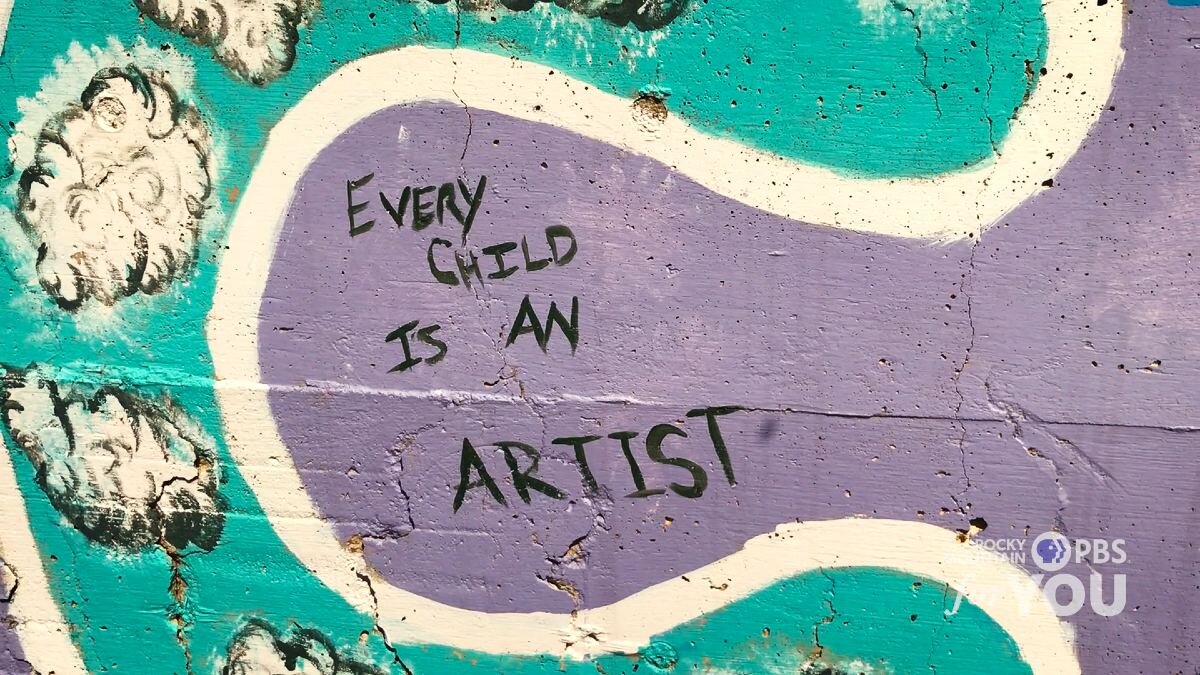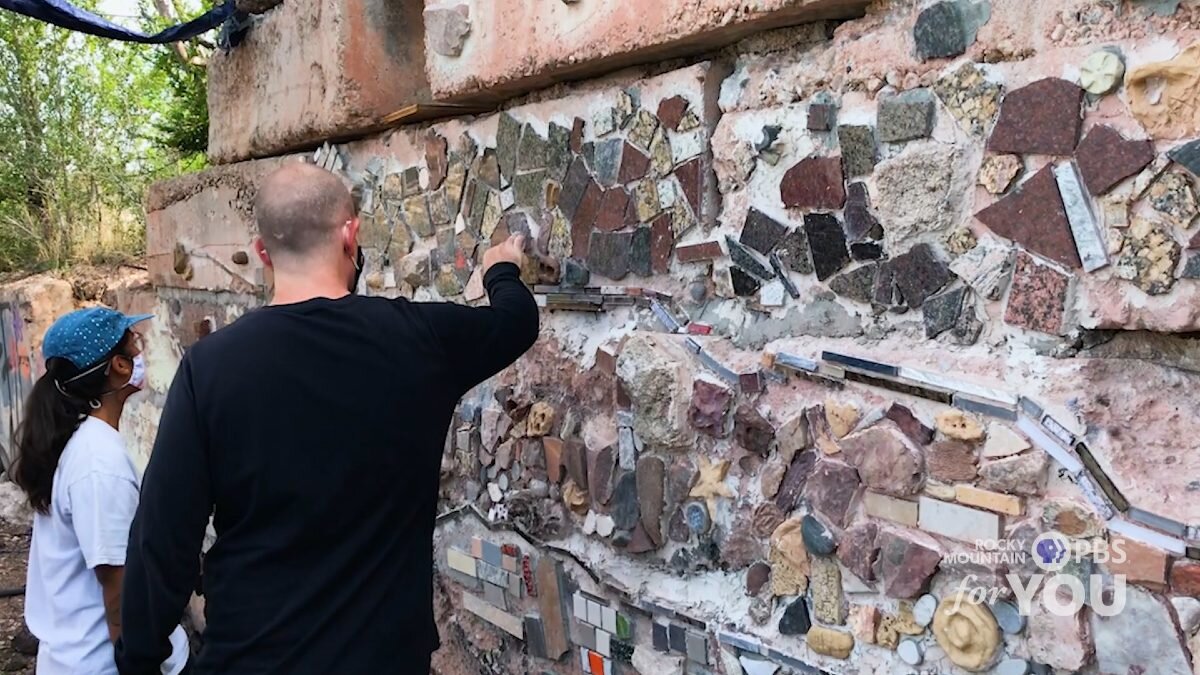Nonprofit rehabilitates illegal dump site into community wonderland

Driving down an inconspicuous back road called South Royer Street, connecting the Hillside neighborhood of Colorado Springs with the Urban Renewal-targeted zone of South Nevada, you might be greeted with a colorful surprise.
Just a stone’s throw from an active train line, an enormous, 22-foot-tall metallic hammer sculpture glistens in the Colorado sun. An information booth boasts kids workshops, ecology seminars, and volunteer opportunities. A fence line adorned with brightly painted, up-cycled bike parts, pallets, and an array of found objects welcomes the curious observer.
“The sky’s the limit,” says Concrete Couch founder and director Steve Wood.
Concrete Couch, a local community-building nonprofit, has beautified and connected the city to its neighborhoods for almost 30 years, working with some of its most under-represented populations on projects ranging from sculptures to job skills to habitat restoration. Now, the organization has taken an opportunity to transform what was once an illegal asphalt and — perhaps ironically — concrete dump site, creating a fortress of family-friendly activities and offerings.
Like a Phoenix rising from ashes and rubble, the small and mighty staff of Concrete Couch are working with hundreds of volunteers to transform what was once an eyesore and blight into a wondrous natural playground, filled with bike and hiking trails, gardens, a soccer field, a stone climbing wall, murals, and more.
It stared, as most things do, with a spark.
“Concrete Couch was looking for a home,” says Wood. “When this came up as a potential site, it rose to the top. It’s right on the edge of a neighborhood we’ve worked in for a long time. And it’s the area of town that is most underserved.”
Wood has worked with Colorado Springs communities since the early 1990s, formalizing Concrete Couch as a nonprofit in 2004. Their association with the Hillside neighborhood goes back just as long. “The Couch,” as the nonprofit is lovingly referred to by locals, held puppet and art-making workshops with Hillside residents in its early days.
In addition to kid and family-led art projects designed to bolster neighborhood nourishment, connection, and community pride, Concrete Couch’s mission centers around permaculture and sustainability, repurposing found objects into up-cycled creations, skill sharing, and job training.
“Our work fits anywhere,” Wood says. “And I think it fits really nicely in this particular neighborhood.”
When Wood and his colleagues initially met on the prospective land, the wheels, he says, immediately began to turn. But the land came with tangible — and environmental — drawbacks.
“This was a site that was really challenged,” Wood says. “It’s an old industrial site, and there was 40 or 50 years of unpermited dumping.”
The land had also become home to one of the city’s tent camp sites.
“People were leaving all kinds of refuse,” says Wood.
Yet beneath the waste, Wood saw potential.
“Of course, we saw the challenges. But we thought there were also lots of opportunities,” he says.
Within his big imagination, the vision was strong. After acquiring the property, the group got to work, setting into motion a complete metamorphosis of the once-tarnished estate.
“We did receive a small Housing and Urban Development grant to clean up the site,” Wood says. “We would have needed a grant one thousand times bigger to actually remove all the asphalt and concrete that was dumped here. But, it enabled us to remove the most obvious piles.”
The project, dubbed “Concrete Coyote” — because, Wood says, “Coyotes are resourceful!” — soon took on a life of its own.
“First and foremost, we’re cleaning it up, improving the ecology, and putting in trails,” says Wood.

True to the Concrete Couch ethos, the terrain’s radical change was a community project from the beginning.
“Every time we have a community group here, we say, ‘What could you imagine out here? What would you like to be involved with?’ And from that, we’re collecting lots of ideas,” says Wood. “We’ve had about 600 sessions in the year and a third that we’ve owned it, with different school groups, community groups, individual kids, and families. It has been really exciting.”
The result of this community-centered brainstorming is “a smorgasbord,” Wood says, of colorful, functional, and at times whimsical topography including gardens, trails, and an adventure playground.
“We have lots of kid and community-designed creations,” says Wood.
Many of these imaginative elements were conceived and created during this summer’s socially distanced summer camp program, an adapted version of the organization’s yearly offering.
“Through the winter, we had a lot of school groups here; the Community Prep School, the Deaf and Blind School, and a number of other organizations,” says Wood. “Well, then COVID hit. And clearly, we were not meeting out here. Schools were out. We didn’t know what we were doing. So we took a couple of weeks off, and in that time we did 100 Zoom classes.”
The Zoom classes, led by community volunteers, supported lessons including bread-baking, sewing, and drawing.
“It was really pretty cool,” Wood says, “especially the 15 or so classes that we had kids teach.”
But, Wood says, “We didn’t want to keep doing Zoom. I mean, there was a time for zoom! And then there was a time to get on the land.”
Staff quickly adapted to meet the pandemic’s changing social guidelines.
“This is the perfect place to get out,” Wood says, motioning to the expanse of projects dotting the 5.6 acre-site. “It’s been pretty easy to keep it safe.”
Over the summer, Concrete Couch taught 100 classes on the property with kids ages nine through 17, often with a one-to-one teaching ratio.
“As we restore the land and bring nature back into it, it’s been a great laboratory to learn all kinds of science and ecology techniques,” says Wood. “We take a weekly survey of the water, and look at what’s growing in it, the temperature, the pH, and the flows. Those are all great introductory science things for kids and adults to do.”
They’ve planted an array of native plants, a small orchard, and are working on a pollinator garden.
“Every time we see a hawk, or we see a new creature that we haven’t seen before, it’s like, ‘Oh, wow, that’s really cool! Check that out!’ I think nature’s coming back,” says Wood.
A mosaic bouldering wall emerged as a standout project of the summer.
“It’s really about teaching hard skills,” says Christine Flores, the organization’s Community Coordinator. “Like how to mix mortar, and how to apply tiles to the wall. But it’s also teaching students to think about where they want to put things in relation to other things; it’s problem solving, in a way.”

“Some of it is being able to say, ‘Now I know how to use a drill,’ or, ‘Now I know how to drive nails,’" says Flores. “But I think it’s also a really important opportunity for the kids to connect with one another. We are in a time when we have to be distant, we have to stay home, and we don’t get to see our friends and family the ways that we used to. It was really important for them to be able to connect with people.”
The feedback was overwhelming positive, Flores says.
“They learned all these skills, and used them to create something that they feel really proud of,” she says. “They were so excited to show their parents.”
Because of the guidelines for social distancing, “Sometimes you feel like, ‘Well, we’re just working with a few kids a day, and it’s not that big of a deal,’” says Wood. “But then you have an event, like the barbecue that culminated from our summer programs. Grandparents and friends came. And you realize, ‘Wow, I worked with that grandparent a bunch of years ago!’ Or, ‘That friend and I built a project together back in 2018 that is now someone’s home!’ It is a community, and there is a support there. What we create in this environment is a really nice way for people to share and build bonds with their neighbors.”
Kids and parents have opportunities to further explore the land and learn science skills during Monday evening’s Science Night, featuring hands-on lessons in watershed science and plant and animal biology. Concrete Couch also offers ongoing trail building workshops on the premise, where families can work on the land and help develop biking, hiking, and walking trails. The organization continues to offer weekend morning skill-sharing events on the second Saturday of each month, and a variety of other specialized programs.
Not to mention Poochie Prommenade — a recurring Wednesday night activity where community members can bring their dogs for a tour of the property.
To see a full list of Concrete Couch’s community programming in Colorado Springs and beyond, visit ConcreteCouch.org.